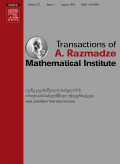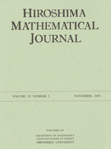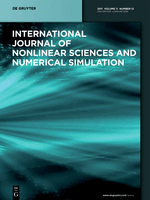
Transactions of A Razmadze Mathematical Institute
Scope & Guideline
Fostering Innovation Through Open Access Research
Introduction
Aims and Scopes
- Advanced Mathematical Theories:
The journal emphasizes the development of advanced theories in various branches of mathematics, including topology, algebra, and analysis, providing a platform for new theoretical insights. - Applied Mathematics:
Research that connects mathematical theories to real-world applications, particularly in engineering and physics, is a significant focus. This includes the study of mathematical models in mechanics, thermodynamics, and fluid dynamics. - Interdisciplinary Approaches:
The journal encourages interdisciplinary research, integrating mathematics with fields such as computer science, statistics, and engineering, highlighting the versatility of mathematical applications. - Innovative Methodologies:
The use of novel methodologies, including computational methods and probabilistic approaches, is a hallmark of the journal, aimed at solving complex mathematical problems. - Boundary Value Problems and Differential Equations:
A substantial portion of the research published involves boundary value problems and various types of differential equations, reflecting the journal's strength in this area.
Trending and Emerging
- Mathematical Modeling and Simulation:
There is an increasing number of publications focused on mathematical modeling and simulation techniques, particularly in areas such as fluid dynamics and thermodynamics, showcasing their relevance in solving real-world problems. - Fuzzy and Uncertainty Theories:
Research exploring fuzzy logic and uncertainty theories has gained traction, reflecting a broader interest in incorporating non-classical approaches to tackle problems that involve ambiguity. - Data Science and Machine Learning Applications:
The integration of mathematical theories with data science and machine learning is emerging as a significant trend, highlighting the journal's adaptation to contemporary research needs and technological advancements. - Boundary-Transmission Problems:
A notable increase in studies related to boundary-transmission problems within the context of elasticity and piezoelectricity indicates a growing interest in complex materials and their behaviors. - Fractional Calculus:
The applications and theoretical advancements in fractional calculus are gaining momentum, reflecting its increasing importance in various scientific and engineering applications.
Declining or Waning
- Traditional Functional Analysis:
Although still relevant, the publication of papers specifically focused on classical functional analysis has decreased, suggesting a shift towards more applied or computational aspects of the field. - Elementary Number Theory:
Research pertaining to elementary number theory seems to be less frequently addressed in recent issues, as the journal's focus moves toward more complex and applied mathematical theories. - Deterministic Models in Stochastic Contexts:
The exploration of deterministic models in contexts where stochastic methods are more beneficial appears to be waning, indicating a potential move towards embracing more probabilistic or stochastic approaches.
Similar Journals

Moscow University Mathematics Bulletin
Pioneering Research in the Realm of MathematicsMoscow University Mathematics Bulletin is a distinguished academic journal published by Springer International Publishing AG, focusing on the dynamic field of mathematics. With an ISSN of 0027-1322 and an E-ISSN of 1934-8444, this journal serves as a platform for innovative research and developments in various mathematics sub-disciplines, making significant contributions to both theoretical and applied mathematics. While it holds a Q3 ranking in the field of Mathematics (miscellaneous) for 2023, this journal remains dedicated to fostering academic discourse among mathematicians. Researchers, professionals, and students will find value in the diverse range of articles that embody rigor and creativity. Although currently not an Open Access publication, the journal provides numerous access options through institutional or personal subscriptions. From its inception in 2007 to its expected continuity until 2024, the Moscow University Mathematics Bulletin is committed to enhancing the understanding and appreciation of mathematical sciences.

BOLETIN DE LA SOCIEDAD MATEMATICA MEXICANA
Championing Excellence in Mathematical ScholarshipBOLETIN DE LA SOCIEDAD MATEMATICA MEXICANA, published by Springer International Publishing AG, is a pivotal journal in the field of mathematics, particularly recognized for its contributions to the miscellaneous mathematics category, holding a commendable Q2 ranking as of 2023. With an ISSN of 1405-213X and an E-ISSN of 2296-4495, the journal serves as a platform for disseminating high-quality research and innovations from both national and international scholars. Operating from Switzerland, the journal encompasses a broad range of topics within mathematics, supporting the development and communication of mathematical knowledge. Although it is not open access, it remains a respected source for researchers, professionals, and students seeking to deepen their understanding of mathematical concepts and applications. Published continuously and rigorously since its converged years, BOLETIN DE LA SOCIEDAD MATEMATICA MEXICANA plays a crucial role in advancing mathematical discourse and collaboration across disciplines.

Research in the Mathematical Sciences
Unveiling Innovations in Mathematical SciencesResearch in the Mathematical Sciences is a prestigious journal published by Springer International Publishing AG, specializing in a diverse range of mathematical disciplines. With an ISSN of 2522-0144 and an E-ISSN of 2197-9847, this journal operates out of Switzerland and has established a reputation for excellence in research dissemination since its inception in 2014. The journal is currently ranked in the highly regarded Q2 quartile for Applied Mathematics, Computational Mathematics, and Mathematics (miscellaneous), along with a Q3 rank in Theoretical Computer Science, reflecting its substantial influence within the academic community. Researchers will find great value in this journal as it features high-quality, peer-reviewed articles that contribute to the advancement of mathematical sciences. The journal promotes open access options, facilitating greater accessibility to innovative research findings. With its comprehensive scope and strong Scopus rankings, Research in the Mathematical Sciences serves as an essential resource for academics, professionals, and students eager to stay at the forefront of mathematical research and its applications.

Hiroshima Mathematical Journal
Elevating Mathematical Scholarship for GenerationsThe Hiroshima Mathematical Journal, published by Hiroshima University, Graduate School of Science, serves as a prominent platform for disseminating high-quality research in the field of mathematics. Established in 1959, the journal has been an integral part of the mathematical community, focusing on areas such as Algebra, Number Theory, Analysis, and Geometry and Topology. Although currently classified in Q4 quartile rankings within its categories, the journal is committed to advancing mathematical knowledge and fostering scholarly dialogue. Its accessibility, combined with its long-standing history, makes it an essential resource for researchers, professionals, and students dedicated to exploring and enhancing the mathematical sciences. For those interested in contributing or accessing cutting-edge research, the Hiroshima Mathematical Journal continues to uphold its mission of excellence in mathematical scholarship.

MEMOIRS OF THE AMERICAN MATHEMATICAL SOCIETY
Pioneering Research for a New Era in Mathematics.MEMOIRS OF THE AMERICAN MATHEMATICAL SOCIETY, published by the American Mathematical Society, stands as a pillar in the field of mathematics, showcasing rigorous research and comprehensive studies that significantly advance the discipline. With a distinguished history indexed under ISSN 0065-9266 and E-ISSN 1947-6221, this journal features work from leading mathematicians, primarily focusing on both applied and theoretical aspects of mathematics. Over the years, it has continuously ranked in the Q1 category for both Applied Mathematics and Miscellaneous Mathematics, reflecting its high impact within the academic community. The journal maintains its relevance and accessibility through stringent peer-review practices, aiming to foster innovative mathematical ideas and solutions from 1996 to 2006 and from 2009 onward, until 2024. With its impressive Scopus rankings and a strong percentile standing, MEMOIRS OF THE AMERICAN MATHEMATICAL SOCIETY is an essential resource for researchers, professionals, and students alike, dedicated to enriching and broadening the understanding of mathematical sciences.

INTERNATIONAL JOURNAL OF NONLINEAR SCIENCES AND NUMERICAL SIMULATION
Advancing the Frontiers of Nonlinear ScienceINTERNATIONAL JOURNAL OF NONLINEAR SCIENCES AND NUMERICAL SIMULATION, published by WALTER DE GRUYTER GMBH, serves as a premier platform for advancing knowledge in the vibrant domains of applied mathematics, computational mechanics, and various fields of engineering and physics. With an ISSN of 1565-1339, this journal has been at the forefront of disseminating significant research findings since its inception in 2000. Its commitment to quality is reflected in its category quartiles for 2023, ranked Q2 in Computational Mechanics and Engineering (miscellaneous), and Q3 in multiple engineering disciplines. Although it currently operates under a subscription model, the journal remains dedicated to presenting groundbreaking studies that explore complex nonlinear phenomena and numerical methodologies. As an invaluable resource for researchers, professionals, and students alike, the journal aims to foster innovation and collaboration across related fields, enhancing both theory and application through its peer-reviewed articles.

Vietnam Journal of Mathematics
Bridging Theory and Application in MathematicsVietnam Journal of Mathematics, published by SPRINGER SINGAPORE PTE LTD, serves as a prominent platform for disseminating high-quality research in the field of mathematics. With an ISSN of 2305-221X and E-ISSN 2305-2228, this esteemed journal has established itself as a noteworthy contributor to the academic landscape since its inception in 2013, continuing its coverage until 2024. Enjoying a Q2 ranking in Mathematics (miscellaneous) for 2023, and holding a commendable Scopus rank of #126 out of 399 in General Mathematics, the journal stands at the intersection of innovation and scholarly excellence. Although still developing its open-access model, it provides a valuable resource for researchers, professionals, and students alike, who are keen to explore the vast universe of mathematical inquiry and application. As the journal progresses, it strives not only to publish original research but also to foster dialogue and collaboration within the global mathematics community.

Frontiers of Mathematics
Fostering Collaboration Across Mathematical DisciplinesFrontiers of Mathematics, published by SPRINGER HEIDELBERG, is an emerging academic journal dedicated to fostering the advancement of mathematical sciences from 2023 to 2024. With an ISSN of 2731-8648 and E-ISSN of 2731-8656, this journal is positioned in the category of Q2 in the miscellaneous mathematics domain, showcasing its commitment to quality research and innovation. Although in its nascent stages, it has swiftly established a foothold within the global academic landscape, holding a Scopus rank of #198/399 and a median percentile of 50, indicating a promising trajectory. By providing an open-access option, Frontiers of Mathematics ensures broad dissemination of research findings, fostering collaboration and knowledge sharing across the mathematical community. Researchers, professionals, and students alike will find this journal to be an invaluable resource, contributing to important discussions and advancements in various mathematical fields.

Acta et Commentationes Universitatis Tartuensis de Mathematica
Connecting Mathematicians through Quality ResearchActa et Commentationes Universitatis Tartuensis de Mathematica is a prestigious academic journal dedicated to advancing the field of mathematics, published by UNIV TARTU PRESS. Located in Tartu, Estonia, this journal has been a prominent platform for scholarly discourse since its inception, covering a diverse range of topics in mathematics from theoretical to applied aspects. With an H-index reflecting its contributions to the literature, it holds a notable position in the Q3 quartile ranking for miscellaneous mathematics as of 2023. While it is not open access, the journal aims to disseminate high-quality research that contributes to the academic community and encourages collaboration among mathematicians. As it converges toward the tenth anniversary of its publication in 2024, the journal continually seeks to publish innovative work and foster the growth of knowledge within the mathematical sciences, making it an essential resource for researchers, professionals, and students alike.

Results in Mathematics
Advancing Mathematical Knowledge, One Result at a Time.Results in Mathematics, published by SPRINGER BASEL AG, is a prestigious academic journal dedicated to advancing the field of mathematics since its inception in 1978. Based in Switzerland, this journal has garnered a significant reputation, holding a Q2 ranking in both Applied Mathematics and miscellaneous Mathematics categories according to the latest 2023 metrics. The journal is a vital resource for researchers, professionals, and students, encouraging open dialogue about emerging mathematical concepts and methodologies. Our editorial objective is to publish high-quality research articles that contribute to theoretical advancements and practical applications in mathematics. Although it does not currently offer open access options, it provides in-depth studies and articles that fortify the knowledge base within the mathematical community. With a commitment to innovation and academic rigor, Results in Mathematics continues to serve as an essential platform for scholarly communication and exploration.